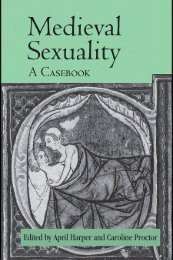Festive Satire: Julian's Misopogon and the New ... - Julian Emperor
Festive Satire: Julian's Misopogon and the New ... - Julian Emperor
Festive Satire: Julian's Misopogon and the New ... - Julian Emperor
Create successful ePaper yourself
Turn your PDF publications into a flip-book with our unique Google optimized e-Paper software.
FESTIVE SATIRE : JULIAN'S MISOPOGON109During <strong>the</strong> <strong>New</strong> Year's Day panegyrics, delivered before a very large audience,Libanius spoke by imperial invitation. He made a number of provocative <strong>and</strong> partisanremarks about <strong>the</strong> emperor's devotion to <strong>the</strong> pagan gods."8 <strong>Julian</strong> was so enraptured by thisperformance that he lost control of himself, jumped up from his seat, <strong>and</strong> flung out hisarms to unfurl his cloak."9 The orator comments in his memoirs, 'loutish persons mightclaim that he became carried away <strong>and</strong> forgot <strong>the</strong> dignity of his position'.30 AlthoughLibanius found something truly regal in this enthusiasm for his own rhetoric, o<strong>the</strong>rs maynot have seen it that way. After all, people would remember Constantius, whoseceremonial demeanour was so august " that he had never been seen to wi~e his nose inpublic.3' Yet even Constantius demonstrated civilitas in <strong>the</strong> hippodrome by enjoyingpopular jokes at his own expense.3"Official ceremonies continued on 3 January. The consul performed <strong>the</strong> vota publicawith sacrifices at Antioch's magnificent gilded temple of Jupiter Capitolinus. A laterantiquarian tells us that it was traditional for <strong>the</strong> crowd to ridicule <strong>the</strong> chief magistrateswith impunity on this occasion, using comic impersonations as well as words.33 Thesoldiers took an oath of loyalty on that day <strong>and</strong> expected an imperial gift in exchange.34<strong>Julian</strong> seems to have taken <strong>the</strong> unfestive stance of refusing <strong>the</strong> donative to Christians whowould not sacrifice in his presence to <strong>the</strong> Genius Augusti.35 Gregory of Nazianzus, in hiscatalogue of <strong><strong>Julian</strong>'s</strong> atrocities against <strong>the</strong> Christians, tells of some unnamed Christiansoldiers who sacrificed to obtain <strong>the</strong>ir donative, later regretted it in <strong>the</strong>ir cups, <strong>and</strong> rushedto <strong>Julian</strong> to turn <strong>the</strong>mselves in. The worst that Gregory can say is that he deprived <strong>the</strong>m of<strong>the</strong> martyrdom <strong>the</strong>y deserved by sending <strong>the</strong>m into e~ile.3~ Would such incidents have hadmuch impact on <strong><strong>Julian</strong>'s</strong> relations with <strong>the</strong> civilian population? A long-lost martyr-act,rediscovered in a Burgundian monastery, would suggest that <strong>the</strong> local bishop <strong>and</strong> his flockdid support <strong>the</strong> protest gestures of Christians in <strong>the</strong> army. This manuscript tells <strong>the</strong> storyof two legionary st<strong>and</strong>ard-bearers who, in late December or early January, refused toremove <strong>the</strong> labarum from <strong>the</strong>ir st<strong>and</strong>ards <strong>and</strong> sacrifice to <strong>the</strong> pagan gods.37 They werecondemned in <strong>the</strong> city by <strong><strong>Julian</strong>'s</strong> uncle, <strong>the</strong> comes orientis, <strong>and</strong> a large procession under<strong>the</strong> leaders hi^ of Bisho~ Meletius escorted <strong>the</strong>m across <strong>the</strong> river to <strong>the</strong>ir beheading. Suchcrowds did nbt hesitate'to voice <strong>the</strong>ir discontent, as we know from <strong>the</strong> crowd that Fhantedpolemical psalms against <strong>Julian</strong> while <strong>the</strong> bones of <strong>the</strong> martyr Babylas were removed fromDa~hne.3~We might also remember <strong>the</strong> exploits of <strong>the</strong> intrepid Publia, an abbess whoincited her virgins to taunt <strong>the</strong> emperor with psalms whenever he passed by.393 January came to a climax with <strong>the</strong> games of <strong>the</strong> <strong>New</strong> Year. They began with anelaborate procession, <strong>the</strong> pompa circensis, which <strong>the</strong> consuls conducted through <strong>the</strong> agora"8 Or. XII. 69, 79-83. procession of 363. For <strong>the</strong> date of this passage see above=9 Or. I. 129. Shaking <strong>the</strong> toga was a traditional n. 26. Cassiodorus, Historia Tripartita VI. 30, mentionsgesture by which persons of authority might demons- <strong>the</strong> Kalends; cf. Greg. Naz., Contra <strong>Julian</strong>um I. 82-3;trate approval for an orator's performance: Philostratus, Lib., Or. X~III. 168.V.S. 626 (Caracalla); Eunapius, V.S. 484 (a proconsul).36 Contra <strong>Julian</strong>um I. 83-4; cf. Lib., Or. XII. 84; xv.<strong><strong>Julian</strong>'s</strong> gesture may have seemed not so much 43; XVIII. 199). Theodoret has <strong>the</strong>m condemned toridiculous as offensively partisan.death <strong>and</strong> on <strong>the</strong>ir knees before, in a Brechtian touch,30 ibid. For a hostile description of <strong><strong>Julian</strong>'s</strong> excitable <strong>the</strong>y are saved by a galloping messenger with a last<strong>and</strong>undignified deportment see Gregory of Nazianzus,Contra <strong>Julian</strong>um 11. 23 (PC 35. 692).minute pardon (HE III. 17).37 SS. Bonosus <strong>and</strong> Maximilianus (Acta Sanctomm,31 Ammianus XXI. 16. 7; cf. xv~. 10. 10. 21 August, vol. 4, 430-2). The story contains an3. Amrnianus XVI. 10. 13 (in Rome). Alan Cameron,Circus Factions (1976), 157-83, offers a comprehensiveimpressive number of circumstantial details, as its firsteditor pointed out: T. Ruinart, Acta Primomm Martyrdiscussionof <strong>the</strong> emperor's relations with his people at orum, 2nd ed. (1713)~ 592. He also observed that <strong>the</strong><strong>the</strong> games; see also id., Bread <strong>and</strong> Circuses: <strong>the</strong> Roman August date is incorrect, since Count <strong>Julian</strong>, who died<strong>Emperor</strong> <strong>and</strong> his People (1973); A. Wallace-Hadrill, soon after sentencing <strong>the</strong>m, met his fate early in 363JRS 72 (19821, 38. (Ammianus XXIII. I. 5-6).33 John Lydus, De Mensibus p. 74 Wiinsch: ~ a i 38 They sang: 'Confounded be all <strong>the</strong>y who worship&&E& TO -rrhj%oy h-rr~a~w-rr~~v €is -rob5 apxov-ra~ 06 graven images, who boast <strong>the</strong>mselves in idols', Soz., HEfifilla~lv, dthha ~ ai axjpaa~v Q-rri~b y~hotQ6~5 Ixova~. v. 19; Socr., HE III. 18.34 Meslin, op. cit. (n. ~g), 62-3.35 SOZ.,HE V. 17. 2; Theodoret, HE III. 12, im-39 <strong>Julian</strong> allegedly sent for her <strong>and</strong> ordered hisbodyguard to box her ears (Theodoret, HE III. 14).mediately following his description of <strong>the</strong> Kalends













